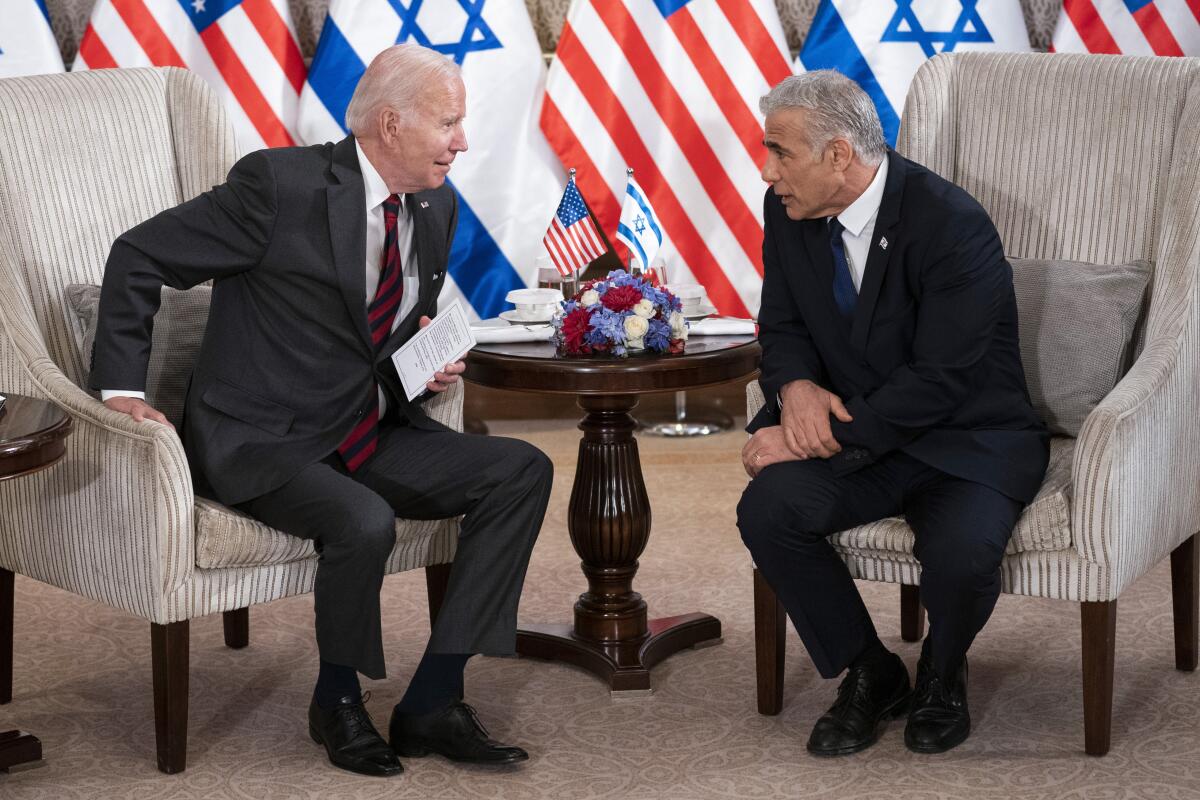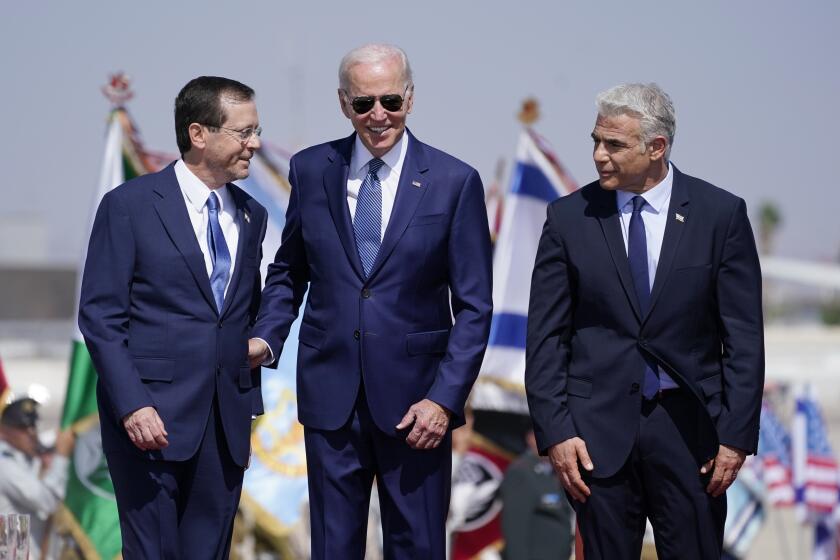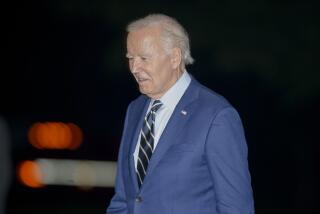Biden won’t commit to confronting Saudi Arabia over journalist’s slaying

JERUSALEM — President Biden on Thursday would not commit to confronting the leaders of Saudi Arabia later this week over the killing of U.S.-based journalist Jamal Khashoggi.
“I always bring up human rights, but my position on Khashoggi has been so clear, if anyone doesn’t understand it in Saudi Arabia — or anywhere else — they haven’t been around,” Biden said at a news conference in Jerusalem.
Biden had pledged during the 2020 election to make Saudi Arabia an international “pariah” over the killing, believed to have been ordered by Saudi leaders, as well as other human rights abuses. But he argued Thursday that it is essential to reengage with the longtime ally to avoid creating a leadership vacuum in the Middle East. Biden, who travels to Saudi Arabia on Friday to meet leaders of that country and others in the region, argued that China and Russia would fill that void if the United States fails.
The threat of Iran is bringing former adversaries together, but allies disagree sharply with President Biden over the solution.
Khashoggi, a dissident, was slain in the Saudi consulate in Istanbul in 2018. U.S. intelligence agencies have concluded the slaying was ordered by Crown Prince Mohammed bin Salman, Saudi Arabia’s de facto ruler.
“The reason I’m going to Saudi Arabia ... is much broader,” he said. “It’s to promote U.S. interests.”
The administration has argued that Biden is seeking to improve the supply chain and shipping access, to strengthen ties between Israel and its neighbors and to head off the growing threat of Iran’s nuclear weapons development.
But the trip is seen at home as an attempt to lower high oil prices — one of Biden’s biggest political liabilities — even as experts say any increase in Saudi production will have little effect on prices at the gas station.
The decision to travel to Saudi Arabia has already created a series of awkward moments and questions. Administration officials, hoping to avoid a photo of Biden shaking Mohammed’s hand, had suggested Biden would not shake hands with any leaders because of concerns over COVID-19. But after arriving to a rapturous welcome ceremony in Tel Aviv on Wednesday, he shook hands with several Israeli officials.
White House officials still will not say whether they will let reporters into the room when Biden meets Mohammed on Friday. But they have ruled out a joint news conference like the one Biden had in Jerusalem.
In that news conference, Bidendefended America’s decision to pursue diplomacy in an attempt to halt Iran’s nuclear weapons program, an effort opposed by Israel and Saudi Arabia.
In pledging to protect Israel’s security, Biden offered support for “an independent democratic Jewish state,” weighing in on a long-running conflict over the role of Palestinians who live predominantly in territories occupied by Israel. Biden at the same time reiterated his support for a Palestinian state.
Israel’s interim prime minister, Yair Lapid, meanwhile, delivered a lengthy warning about negotiations with Iran, which he said was bent on destroying “the only Jewish state in the world.”
In first trip to the Middle East as president, Biden faces tough talks on Iran, oil and security.
Biden favors a return to a 2015 pact — negotiated by the Obama administration and dumped by President Trump — that sought to constrain Iran’s ability to enrich uranium. Israel argues the agreement did not go far enough in ensuring compliance or preventing Iran from resuming its efforts, especially after it eventually expired.
“Words will not stop them, Mr. President. Diplomacy will not stop them,” Lapid, standing at a lectern beside Biden, said. “The only way to stop them is to put a credible military threat on the table.”
“It must not be a bluff. But the Iranian regime must know that if they continue to deceive the world,” he continued, “they will pay a heavy price.”
Biden offered “an ironclad commitment of the United States of America to defend Israel’s security.” But when asked, he declined to put a timetable on ending diplomacy with Iran, even as Israel has argued Tehran is simply buying time as it gets closer to building a weapon.
.
“We have laid out for the leadership of Iran what we’re willing to accept,” Biden said. “We’re waiting for their response. When that will come, we are not certain, but we are not going to wait forever.”
Though the conflict between oil and human rights has dominated much of the discussion at home, the Iran question looms largest here.
Biden said several times during his visits with Lapid and other Israeli officials that he wants to foster further security cooperation among Israel and its long-time Arab adversaries. Those closer ties have been driven by mutual fears of Iran. In Saudi Arabia, Biden will also meet with leaders from Egypt, Jordan, Iraq and six Persian Gulf nations as part of a regional conference.
Biden told reporters that he and Lapid spoke “about how important it was, from my perspective, for Israel to be totally integrated into the region.”
Israelis and Saudis, whose governments do not have formal diplomatic ties, are working to enhance cooperation in combating Iran. But they are both hoping that the U.S.-backed deal falls apart. If it doesn’t, they at least want to remain part of the discussions with U.S. officials and help shape the response if Iran fails to comply.
To that end, Lapid and Biden signed a declaration that commits the U.S. “never to allow Iran to acquire a nuclear weapon,” and “to use all elements of its national power to ensure that outcome.”
The visit with Lapid is unusual in that he is a caretaker prime minister who recently took office after the government dissolved. He is campaigning to win the office permanently in November elections.
Biden has tried to stress that the American relationship with Israel is not dependent on personalities or partisan politics, despite former President Trump and other Republicans becoming more closely aligned with Israel’s conservative leaders. Biden met later Thursday with Benjamin Netanyahu, the former prime minister who was close to Trump and with whom the current president has enjoyed a frosty relationship.
More to Read
Sign up for Essential California
The most important California stories and recommendations in your inbox every morning.
You may occasionally receive promotional content from the Los Angeles Times.













